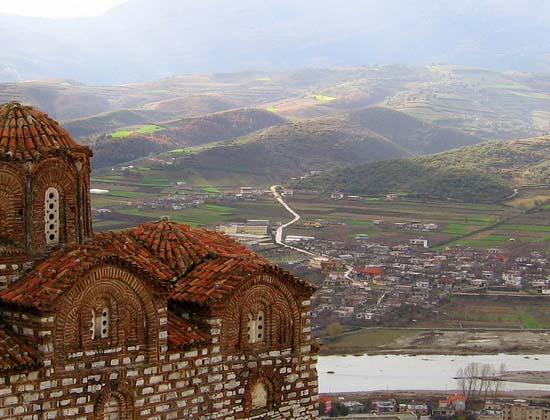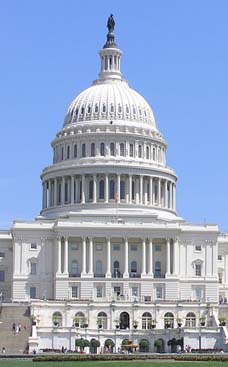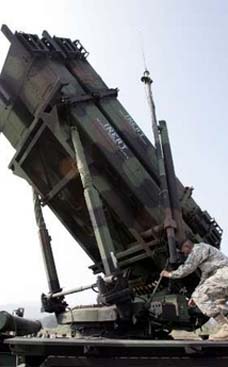
Grzybowski works with the Institute of Cultural Monuments, Albania's historic preservation agency, to keep the country's centuries-old homes, churches, and mosques in lasting condition. To do so, he has brought the agency's provincial office in Berat into the 21st century. "I've been a technical resource in getting their computers up to snuff," Grzybowski explained. "They had outdated software and viruses when I got here. I straightened that out. And when the local phone service introduced high-speed Internet, I set that up as a shared connection for the computers in the office. I also digitized some video for them," he said with the can-do attitude you'd expect of a corps volunteer.
Ray Grzybowski is a Peace Corps Volunteer in Berat Albania
Younger than that now
An aging wave of Peace Corps volunteers finds new reasons to act on an old idealism
By Daniel Brook | November 26, 2006
Caption: Castle in Berat Albania Photo: alwynt Flickr Creative Commons Attribution-NonCommercial-ShareAlike 2.0
RAY GRZYBOWSKI, THE PEACE CORPS volunteer who recently showed me around the historic walled city of Berat, Albania, in many ways fits the stereotype. Bright and idealistic, Grzybowski is a graduate of Rensselaer Polytechnic Institute in upstate New York, and now works with the Institute of Cultural Monuments, Albania's historic preservation agency, to keep the country's centuries-old homes, churches, and mosques in lasting condition. To do so, he has brought the agency's provincial office in Berat into the 21st century.
"I've been a technical resource in getting their computers up to snuff," Grzybowski explained. "They had outdated software and viruses when I got here. I straightened that out. And when the local phone service introduced high-speed Internet, I set that up as a shared connection for the computers in the office. I also digitized some video for them," he said with the can-do attitude you'd expect of a corps volunteer.
But in one respect, Grzybowski does not fit the conventional Peace Corps image. He is 58 years old.
When the Peace Corps was founded in 1961, its volunteers were nearly all recent college graduates, dubbed "Kennedy's Kids," after the new president who created the program by executive order. Grzybowski was just 14 years old at the time, but the founding made an impression. "I remember being struck at the time that this sounded like a great idea, that we were going to invest in building peace and understanding between nations rather than just spending money on defense."
But after college Grzybowski soon had a job, a wife, and a family. It was not until he retired from a computer consulting company in Maryland that he considered joining up. "I wanted to keep busy. I was looking for a volunteer activity, particularly something where I could put my computer skills to use," he told me.
These days Peace Corps volunteers like Grzybowski are not as unusual as they once were. When the program was founded, Sargent Shriver, Kennedy's brother-in-law and the first director of the Peace Corps, advised the president that though young people would presumably be the most likely applicants, he saw no reason to impose an upper-age limit for volunteers. In the first group of volunteers, less than 1 percent were over 50; in today's Peace Corps, they make up more than 6 percent, or more than 400 volunteers.
The growth in the number of older volunteers is the result not just of older Americans feeling vigorous enough to take on a challenge like the Peace Corps. As America's popularity in the world has sunk to new lows, it seems many Americans -- including many graying children of the New Frontier -- hope to project a different image of the United States by volunteering abroad. Meanwhile, as the Peace Corps has taken on more sophisticated tasks it has begun to actively recruit more experienced volunteers, many of whom, like Grzybowski, are eager for a second chance to be a Kennedy Kid.
Over the last decade, as the Corps has responded to the AIDS crisis, for example, or helped developing countries with technologically sophisticated methods of environmental protection, it has seen a need for more skilled volunteers. There's currently a "blitz for social workers and nurses to do HIV/AIDS work," said Peace Corps spokesperson Joanna O'Brien.
But it's not just experienced service professionals who are being recruited. People from the private sector -- tech world veterans like Grzybowski as well as engineers and business people -- are also in high demand. And because all volunteers receive the same stipends regardless of experience, the Peace Corps, unlike a conventional employer, doesn't have to pay a premium for more experienced people.
Retirees, for their part, may be better equipped than recent college graduates to make the financial sacrifices that volunteering entails: 27 months of living on a stipend designed to put volunteers' living standards in line with the community they serve. The unprecedented tuition and mortgage debts facing today's twenty- and thirty-somethings are flipping the old norm that young people are footloose while old people are tied down. "A 35-year-old still has student loans....Or they're married and they just bought a condo," O'Brien said. "Someone in their 50s has paid off their mortgage, but they still feel young and energetic."
Since 2003, the Peace Corps has been holding recruiting events aimed specifically at this age group. But changing the perception that the Peace Corps is for "kids" has been an uphill battle. Deputy director Jody Olsen, who recently gave recruiting presentations at the AARP convention in Anaheim, said that few Americans are aware that the program is open to all ages. "I just got back from North Carolina State University," Olsen told me, and "I was surprised at the number of faculty and administrators who asked me, 'What is the upper age limit?' I explained that we've had people in their upper 80s." The oldest current volunteer is 79; the oldest ever was 86.
Today's Peace Corps recruitment materials showcase older volunteers in photographs. Some brochures specifically target applicants over 50, selling them on the benefits of leaving our youth-obsessed culture. "Do people tell you you're over the hill?" reads one brochure. "What if you were over the hill, and over an ocean, to another continent. Where elders are looked to as leaders."
Even outside the proverbial African village with its council of elders, older volunteers' experiences tend to bear this out. "Part of their culture is to respect age and experience," Grzybowski said of Albania. "By virtue of the fact that I'm older and they know I've worked for so many years in the computer field, I think they give me a lot of respect, more than a younger person would get."
In the tech industry in the United States, by contrast, Grzybowski said "there's often the tendency to look to young people who are up on new technology."
It will be interesting to see if the rise in older volunteers continues after the generation of grown-up Kennedy's Kids ages out. San Diego State University historian Elizabeth Cobbs Hoffman, author of "All You Need is Love: The Peace Corps and the Spirit of the 1960s," calls the recent increase in 50-plus volunteers the "baby boom echo." She suspects some people who saw the odds and didn't even apply back in the mid-1960s, when the Corps was getting more than 40,000 applications annually, are applying now, when only some 12,000 applications come in each year.
But even today's numbers, Hoffman notes, show renewed interest after the nadir of the late 1990s, when applications slipped below 10,000 for the first time in Corps history. In the last five years, applications have been up among all age groups. Deputy director Olsen attributes the post-9/11 rise to volunteers "wanting to represent who people are as Americans."
For Grzybowski, Kennedy's impulse to invest in cross-cultural understanding, not merely defense, sounds as sensible today as it did during the Cold War -- if not more so. Ironically, President Bush's post-9/11 ultimatum -- "either you are with us or you are with the terrorists" -- may have had an effect on Peace Corps recruitment similar to Kennedy's exhortation: "My fellow citizens of the world: ask not what America will do for you, but what together we can do for the freedom of man."
Daniel Brook's first book, "The Trap: Selling Out to Stay Afloat in Winner-Take-All America," will be published in the spring.
© Copyright 2006 Globe Newspaper Company.

















